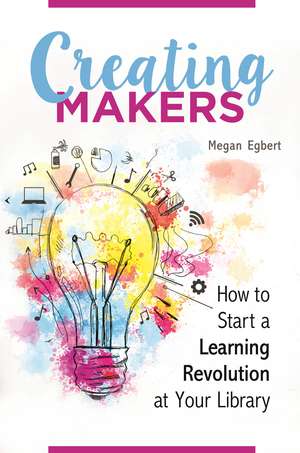Creating Makers: How to Start a Learning Revolution at Your Library
Autor Megan Egberten Limba Engleză Paperback – 17 iul 2016 – vârsta până la 17 ani
Preț: 261.41 lei
Preț vechi: 319.92 lei
-18% Nou
Puncte Express: 392
Preț estimativ în valută:
50.03€ • 52.09$ • 42.28£
50.03€ • 52.09$ • 42.28£
Carte tipărită la comandă
Livrare economică 10-24 martie
Preluare comenzi: 021 569.72.76
Specificații
ISBN-13: 9781440843860
ISBN-10: 1440843864
Pagini: 124
Dimensiuni: 156 x 235 x 8 mm
Greutate: 0.23 kg
Editura: Bloomsbury Publishing
Colecția Libraries Unlimited
Locul publicării:New York, United States
ISBN-10: 1440843864
Pagini: 124
Dimensiuni: 156 x 235 x 8 mm
Greutate: 0.23 kg
Editura: Bloomsbury Publishing
Colecția Libraries Unlimited
Locul publicării:New York, United States
Caracteristici
Offers librarians creative ways to become involved in the exciting maker movement and encourage maker mentality among patrons
Notă biografică
Megan Egbert is district programs manager, Meridian Library District, ID.
Cuprins
AcknowledgmentsIntroductionSECTION I: MAKER MENTALITYChapter 1: What Is a Maker?Characteristics of MakingMaking versus TinkeringFrom Consumer to CreatorWhat Is Not MakingChapter 2: Making for EveryoneMaking for All AbilitiesMaking for All AgesMaking Is for GirlsMaking across CurriculumChapter 3: Why Making Matters for IndividualsLearning through FailureLearning Empathy through DesignMaker EmpowermentCuriosityEngagementChapter 4: Why Making Matters for LibrariesEntrepreneursOut-of-School LearningParticipatory Culture21st Century Learning SkillsCreativity and the Importance of PlayBecause It Works-Kind OfSECTION II: CREATING MAKERSChapter 5: Making in Any SpaceSmall SpacesMobile SpacesStealth ProgramsPop-up or Dispersed SpacesMaking through CirculationMaking through PartnershipsChapter 6: Access to MakingAccess and VisibilityCostLocationPolicies and LegalitiesSafetyChapter 7: Teaching MakersInquiry-based LearningConstructionismLearning PathsRapid PrototypingDesign ProcessEvaluate Your ProgramsChapter 8: Creating a Culture of MakersAllow Staff Time to MakeAllow Opportunities for Staff to Share Their TalentHire or Train the Staff You NeedCreate a Culture That Celebrates FailureCreate a Culture That Celebrates CreativityShare Your StoryConclusionReferencesIndex
Recenzii
This text provides a balance between well-thought-out and researched support for makerspaces as well as practical ideas to help librarians through the hurdles of beginning one. . . . This text is a worthwhile resource for any library considering starting a learning revolution.
Egbert has written one of the best informational texts about makerspaces and the maker movement that this reviewer has read, largely due to her focus on creating makers, not just spaces. This should be the first resource librarians read when determining how to get started with makerspaces. Also, those librarians seeking justification for a makerspace, either with regard to budget or facility, will find ample research examples of how a maker mentality and fostering a learner's curiosity support learning and literacy. Regardless of age or level of experience or education, librarians will find a fresh and insightful perspective of maker culture in this book.
Egbert has written one of the best informational texts about makerspaces and the maker movement that this reviewer has read, largely due to her focus on creating makers, not just spaces. This should be the first resource librarians read when determining how to get started with makerspaces. Also, those librarians seeking justification for a makerspace, either with regard to budget or facility, will find ample research examples of how a maker mentality and fostering a learner's curiosity support learning and literacy. Regardless of age or level of experience or education, librarians will find a fresh and insightful perspective of maker culture in this book.





